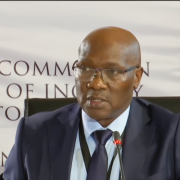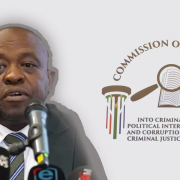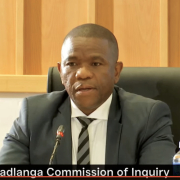|
Getting your Trinity Audio player ready...
|
After KwaZulu-Natal (KZN) police commissioner Lieutenant-General Nhlanhla Mkhwanazi’s testimony over the three days of week one, it was the turn on Monday 22 September of national police commissioner Fannie Masemola, who took the stand to be questioned by chief evidence leader Terry Motau.
On the following Saturday we learned that Motau had been wanting to leave the commission, as reported by City Press, and it has since been revealed that Motau has indeed quit and Matthew Chaskalson has taken over as chief evidence leader.
Day 4 (22 September)
Masemola began by giving an account of his career in the service, which began in 1987. He was then led in evidence regarding the South African Police Service (SAPS) and the criminal justice system. “You refer to the three pillars that guide the South African criminal justice system. If I can request you to deal with those three pillars which you deem to be foundational?” asked Motau.
The justice system is guided by a clear division of three pillars, said Masemola – the police, the prosecution authority, and the correctional services. “The first pillar of the police serves as the front line of law enforcement, which involves crime prevention, crime investigation, gathering of evidence, and apprehension of suspects with a view to secure evidence for the courts and ultimately bring that to the next pillar, which is the National Prosecuting Authority (NPA).”
This is responsible for deciding whether sufficient evidence exists to prosecute. Within this pillar, added Masemola, sits the judiciary. The third pillar takes over once the court has delivered its verdict, overseeing the incarceration of offenders and the management of alternative community-based sentences, rehabilitation programmes, and reintegration into society.
“Taken together, these three pillars work in concert to uphold the rule of law, protect communities, ensure justice is served, and foster public trust in the criminal justice system.”
The discussion then veered into the differentiation between operational or managerial and policy directions within the police service. Madlanga wanted to know this distinction because Masemola’s main proposition in his affidavit is that Police Minister Senzo Mchunu’s disbandment instruction (regarding the KwaZulu-Natal Political Killings Task Team [PKTT]) strayed into operational or managerial territory, whereas the minister is responsible only for issuing national policy.
In Masemola’s view, Mchunu’s order for the immediate disbandment of the PKTT was “totally encroachment into the mandate of the national commissioner in terms of performance of my duty”.
Madlanga then asked if the minister were to stray from policy into operational or managerial matters, “would a national commissioner be legally entitled to disobey the minister?” Masemola answered that a national police commissioner could indeed do such a thing, adding that if he were to find himself in such a situation, he would refuse to obey the order, but also ask the minister what his reasons were for giving such an order. “It depends.”
Other topics on the day covered the history and operational details of the PKTT and extensive discussion into the disbandment of the unit, and the April 2024 murder of Vereeniging engineer Armand Swart.
Day 5 (23 September)
Masemola returned to the stand to take the commission through topics such as the report he provided to Mchunu about the disbanding of the PKTT. On Motau’s request, he read through the report’s conclusion, saying that the president’s initial directive had been achieved with a noticeable decrease in political killings in KZN.
“South African Police Service remains responsible for finalisation of those dockets in possession of the task team as well as finalisation of dockets which are currently before court.”
He then elaborated on the steps being taken to wind down the PKTT team without compromising pending investigations or court processes. No new dockets would be accepted, but the 128 case dockets which are “under investigation and allocated to the task team will be retained by the task team and investigations will be finalised. An audit will be done of those dockets still under investigation in order to establish which dockets can be returned to station of origin or allocated to other investigating units within SAPS.”
The current capacity of the task team would be gradually scaled down to only personnel who are required to finalise dockets retained by the task team, said Masemola – but this would depend on the 115 case dockets currently before the courts. The PKTT would have to be active at least until the end of the year to see the completion of the dockets through. “It is anticipated that the team will complete the work before the end of the year 2025. However, the seriousness of the cases and the processes at court will indicate the course of action.”
He spoke about various cases involving the PKTT, such as the murder of ANC councillor Sindiso Magaqa, who was fatally shot in 2017, and an investigation into alleged corruption and fraud – and later murders – at Fort Hare University.
Madlanga asked him, in respect of his statement that “knowing what I know now, what I considered to be irrational and inexplicable encroachment into operational issues, is now explained by [Mchunu’s} desire to halt investigations against criminal cartels by disbanding the PKTT”, whether he had always held this view or had come by it recently. “I did hold that view from the beginning when this directive was issued, Commissioner, but of course that is General Masemola’s view,” he replied.
Other topics covered during the day included the “health risk” contract awarded to Cat Matlala, the ongoing tension between Masemola and Deputy Police Commissioner Shadrack Sibiya – the subject of a mediation meeting chaired by Mchunu in January 2025, which Masemola views as political interference – and complaints of irregular formation, corruption, malicious arrest, use of torture, and disappearance of case files, among others, by KZN violence monitor Mary de Haas in relation to the PKTT. Masemola dismissed these allegations, saying none of them had any substance.
This concluded his testimony.
Day 6 (25 September)
Major-General Petronella van Rooyen took the stand today, led by Motau. She holds an LLD in criminal law, is the head of governance, legislation, and policy at the SAPS Legal Services Division, and has been in the service for almost 42 years.
Invited to appear before the commission, she testified on various matters including Mchunu’s decision to disband the PKTT and whether the decision was valid and legal, given Masemola’s testimony earlier in the week that in his view, Mchunu overstepped his authority.
Van Rooyen’s testimony began with an explanation of her core functions. “It involves the management of legislative and regulatory functions to ensure the legal vetting of new and revised policies in the police and to provide legal support on advocacy functions as well as to manage and utilise human financial, physical, and information resources in accordance with the strategies, priorities, and regulatory framework of the police.”
She reports to the divisional commissioner for legal services, and they in turn report to the national commissioner.
Her statement to the commission, said Motau, covers “the constitutional and statutory framework regulating SAPS. You provide a legal overview of the applicable legislation and policies regulating the SAPS. You also provide a detailed analysis of oversight mechanisms that regulate SAPS. You proceed to then deal with the disbandment of the PKTT by the minister and you provide your view on whether the conduct accords with the statutory framework set out in your statement, and you conclude by making some general observations on legal aspects that have been raised and identify potential deficiencies, in respect of the oversight mechanisms”.
Van Rooyen clarified that no member of a security service may obey a manifestly illegal order, as they must always act in accordance with the Constitution and the law. Asked by Madlanga to whom, in her opinion, that provision applies, she said: “it’s my submission that it relates to any member irrespective of where the order comes from. But if it is in the execution of his powers as a police official, it will mean that he cannot obey a manifestly illegal order.”
Asked by Motau whether this would also apply to orders emanating from outside SAPS, she said yes.
She was asked to clarify the role and powers of the minister of police, saying: “The need to clarify the role of the minister has been repeatedly raised as a concern. It appears that there are different interpretations to words given in or words contained in section 207 of the Constitution that requires the national commissioner to exercise control over and manage the police service in accordance with the national policing policy and the directions of the Cabinet member responsible for policing.”
In his testimony, Masemola had questioned whether the instruction to disband the PKTT was policy or operational. Asked for her view of this, Van Rooyen said she did not believe Mchunu had that authority because the instruction relates to operational matters.
“The decision of the minister to close a political task team that was responsible for the investigation of crime in my view fell outside the mandate or authority of the minister.”
Mchunu “unlawfully” strayed into the constitutional competence of the national commissioner when he issued the letter for the disbandment of the PKTT, said Van Rooyen. “What would have been an appropriate path is for the minister to express that he no longer no longer considers political killings to be a priority and direct the national commissioner to consider and take steps to align it with his directive.”
It can never be appropriate for a minister to instruct the national commissioner not only to disband the PKTT, she said, but to say that the disbandment must be done immediately.
Further testimony of the day covered the roles of the three deputy national commissioners and of provincial commissioners, the “failure” of the Portfolio Committee on Police to act on Mkhwanazi’s allegations which were brought to it before his explosive press briefing in July, and more about the operations of the PKTT.
This concluded her testimony.
Day 7 (26 September)
KZN director of public prosecutions Adv Elaine Harrison took the stand, led by Matthew Chaskalson.
She started with a brief history of her career in the NPA, which started in 2000. She then explained more about her legislated powers and responsibilities – these include the power to institute and conduct criminal proceedings and to carry out functions incidental thereto; to supervise, direct, and coordinate the work and activities of all deputy directors and all prosecutors; and to supervise, direct and coordinate specific investigations and carry out other duties and functions.
Chaskalson then asked for her overall view of the PKTT and what value, if any, it had.
“As the Director of Public Prosecutions for KwaZulu-Natal, I have considered the Political Killings Task Team as an essential and necessary structure for the province of KwaZulu-Natal and the country as a whole. This is so as the team was precisely aimed at dealing with politically motivated and related crimes,” said Harrison.
She was on leave in December 2024 and first heard about the proposed disbandment of the PKTT via social media. “I thought it was fake news.”
When she returned to the office, she learned it was not.
“The team had been informed by General [Dumisani] Khumalo to only continue with matters that had been enrolled or were waiting for decision.”
She later said: “At no stage was any formal communication addressed to my office notifying us of the disestablishment of the task team.”
Chaskalson then asked her about a letter she had sent in May 2025 to Mkhwanazi, in response to one from him on 22 May which discussed the removal of case dockets from her office – at least four months after rumours of a potential PKTT disbandment began circulating on social media – but not mentioning such potential disbandment although, she implied, he must have known.
“Kindly take note that the purpose of this correspondence is related to the issue of whether the political task team continues to exist,” she read from the letter. “There have been a number of media reports whereby it has been noted that the political task team has been disbanded … There has been no formal communication to the office of the national director of public prosecutions as well as my office on this on this issue. “
She expressed great concern about the uncertainty, saying that with local government elections coming up in 2026, it was very likely that political violence would break out. “Every time that there are elections, this is the norm that happens in KZN.”
Asked by Commissioner Sandile Khumalo if she agreed with Mkhwanazi’s view that the PKTT showed great success with prosecution in KZN, she said that she did. “If you look at our database with regards to the finalised cases, for example in 2025, all the matters that have been recorded there are successful prosecutions.”
Chaskalson asked her about her decision to give politically related and political killings cases to the NPA’s organised crime component (OCC). She explained the structure of the OCC and said it was a decision to help with the operational issues the NPA was struggling with at that time. “There was just no recruitment taking place because of the austerity measures that were in place at the time … the organised crime component sits in Durban and the task team also sits in Durban, meaning that it would be easier for them to deal with the work.”
Harrison’s further testimony covered, among others, how political cases are handled, the impact of the effort to disband the PKTT on the unit’s efficient functioning, and the unit’s current status.
This concluded her testimony.






